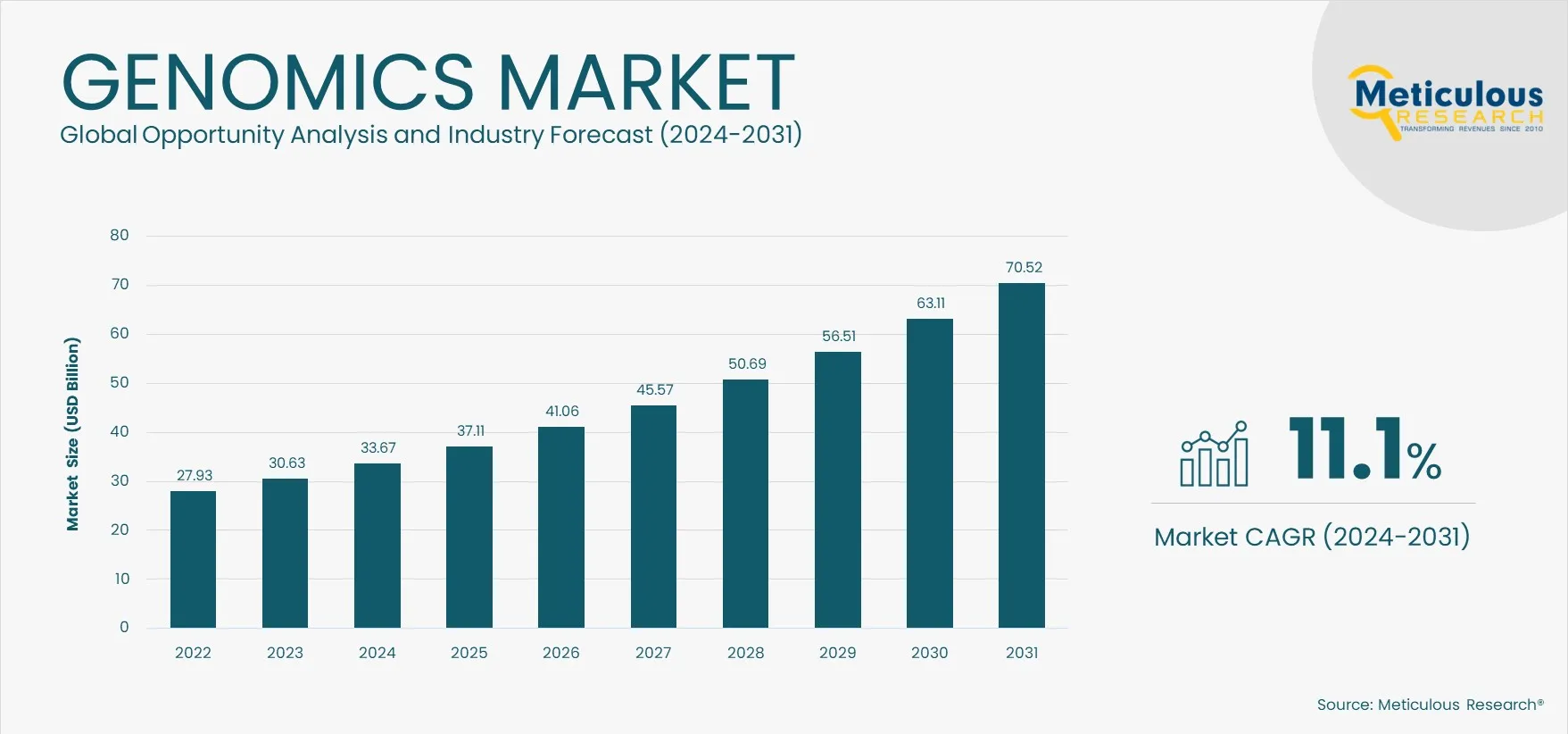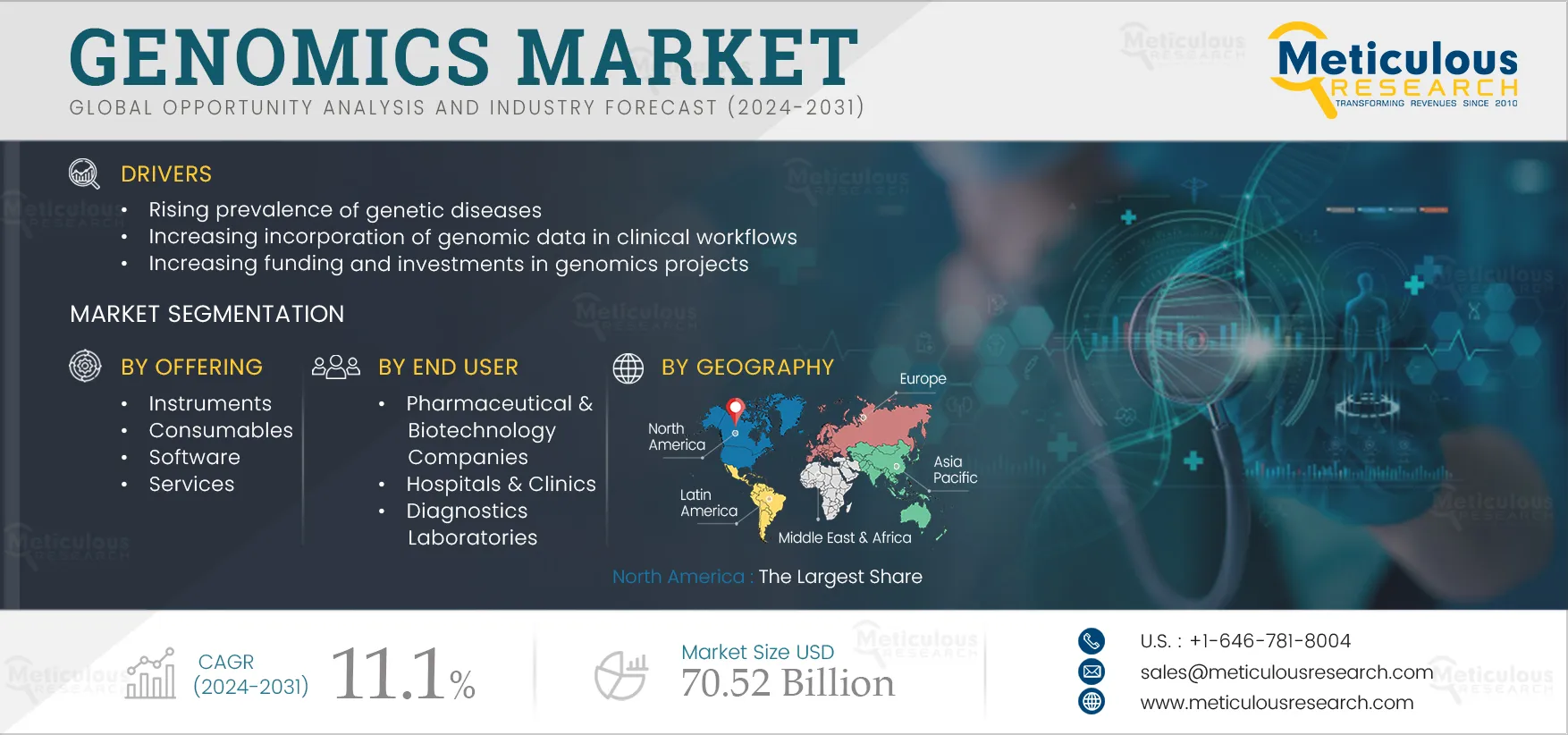The Genomics Market is projected to reach $70.52 billion by 2031, at a CAGR of 11.1% from 2024 to 2031. Genomics studies the structure, function, evolution, and mapping of genomes. It involves several operations, from sequencing to analysis, to understand the genetic basis of various biological phenomena. Genomics can be applied to various fields, including medicine, agriculture, biotechnology, and ecology, and is critical for understanding the complexity of living organisms. By understanding the genetic makeup of an organism, researchers can develop targeted therapies, design new crops and livestock, and gain insights into evolutionary history and ecological interactions.
The growth of the genomics market is driven by the rising prevalence of genetic diseases, the increasing incorporation of genomic data in clinical workflows, increasing funding and investments in genomics projects, the growing applications of genomics in the healthcare sector, rising pharmaceutical R&D expenditures, and increasing healthcare spending. However, the lack of standardized approaches in genomics and concerns over the security & privacy of genomic data restrain the growth of this market.
Moreover, the rising adoption of personalized medicines and gene therapies is expected to generate market growth opportunities. However, the shortage of skilled bioinformatics and genomics personnel and the commercialization and scaling of genomic technologies are major challenges for market stakeholders.
Here are the top 10 companies operating in the Genomics Market:
Thermo Fisher Scientific Inc. (U.S.)
Founded in 2006 and headquartered in Massachusetts, U.S., Thermo Fisher Scientific Inc. is a biotechnology company primarily engaged in life sciences research, improving patient diagnostics, and increasing laboratory productivity. Thermo Fisher Scientific has four reportable business segments: Life Sciences Solutions, Analytical Instruments, Specialty Diagnostics, and Laboratory Products and BioPharma Services. Genomics products are offered through the Life Sciences Solutions segment.
The company has operations and a presence in approximately 50 countries outside the U.S. and major manufacturing and distribution facilities worldwide, including the U.S., Australia, Canada, China, Denmark, Finland, France, Germany, Japan, Singapore, Sweden, and the U.K.
Some of its subsidiaries of the company are Thermo Fisher Germany B.V. (Netherlands), Thermo CRS Holdings Ltd. (Canada), Life Technologies Australia PTY Ltd. (Australia), Thermo Fisher Scientific New Zealand Limited (New Zealand), Thermo Fisher Scientific SpA (Italy), and Thermo Fisher Scientific K.K. (Japan).
Founded in 1998 and headquartered in California, U.S., Illumina, Inc. provides sequencing and array-based solutions for genetic and genomic analysis. The company offers integrated sequencing and microarray systems, consumables, and analysis tools used by genomic research centers, academic institutions, government laboratories, and hospitals, as well as pharmaceutical, biotechnology, commercial molecular diagnostic laboratories, and consumer genomics companies. The company operates its business through the Core Illumina and GRAIL segments. The company offers its products through both of these segments.
Illumina markets and distributes products across the U.S., Europe, Latin America, and Asia-Pacific. The company’s office, lab, and manufacturing facilities are located in the U.S., Singapore, and the U.K.
Some of the names of the subsidiaries are Illumina GmbH (Germany), Illumina Australia Pty. Ltd. (Australia), Illumina UK, Ltd. (U.K.), Illumina Italy S.r.l. (Italy), Illumina Netherlands B.V. (Netherlands), and Illumina K.K. Japan (Japan).
Qiagen N.V. (Netherlands)
Founded in 1984 and headquartered in Venlo, Netherlands, Qiagen N.V. is one of the leading providers of sample and assay technologies for molecular diagnostics, applied testing, and academic and pharmaceutical research.
Qiagen’s product offerings include diagnostics solutions, PCR products, genomic or NGS products, consumables, and instruments for sample technologies. Further, the company offers more than 500 core products consisting of instruments, kits, bioinformatics solutions, and a wide range of NGS services, such as RNA sequencing services, DNA sequencing services, whole genome amplification services, and RNA isolation services. These NGS offerings are offered under the Genomics/NGS products category.
The company markets products in more than 130 countries across the globe. Some of the major subsidiaries of the company are Qiagen AB (Sweden), Qiagen AG (Sweden), Qiagen GmbH (Germany), QIAGEN LLC (U.S.), QIAGEN China (Shanghai) Co. Ltd. (China), QIAGEN Inc. (Canada), QIAGEN K.K. (Japan), and QIAGEN S.r.l. (Italy).
Danaher Corporation (U.S.)
Founded in 1969 and headquartered in Washington, D.C., U.S., Danaher Corporation is a science and technology company. It comprises more than 20 operating companies with positions in life sciences, diagnostics, environmental, and applied sectors, organized into four segments: Biotechnology, Life Sciences, Diagnostics, and Environmental & Applied Solutions. Genomics products such as instruments, genomic sample preparation, and genomic consumables are offered under the Life Sciences and Diagnostics business segment.
The company has facilities in over 60 countries, including approximately 244 administrative, sales, R&D, manufacturing, and distribution facilities. Out of these, 90 facilities are in the U.S. in over 20 states, and 154 are located outside the U.S., primarily in Europe and, to a lesser extent, in Asia, South America, Canada, and Australia. The subsidiaries providing genomics products include Phenomenex Inc. (U.S.), Integrated DNA Technologies, Inc. (U.S.), Cepheid (U.S.), Aldevron Fargo (U.S.), Cytiva (U.S.), Beckman Coulter Life Sciences (U.S.), and Molecular Devices, LLC. (U.S.).
Agilent Technologies, Inc. (U.S.)
Founded in 1999 and headquartered in California, U.S., Agilent Technologies, Inc. provides application-focused solutions to the life sciences, diagnostics, and applied chemical markets. The company operates through three business segments: Life Sciences and Applied Markets, Diagnostics and Genomics, and Agilent CrossLab. The genomic products are offered through Life Sciences and Applied Markets and Diagnostics and Genomics business segments.
The Diagnostics and Genomics business segment offers genomic products. Genomics business includes arrays for DNA mutation detection, genotyping, gene copy number determination, identification of gene rearrangements, DNA methylation profiling, gene expression profiling, next-generation sequencing (NGS) target enrichment, and genetic data management and interpretation support software.
The company has its primary R&D and manufacturing sites in California, Colorado, Delaware, Massachusetts, Texas, Vermont, and Washington in the U.S., Australia, China, Denmark, Germany, Italy, Japan, Malaysia, Singapore, and England, in the U. K. Some of its subsidiaries are BioTek Instruments (U.S.), and Varian, Inc. (U.S.).
Bio-Rad Laboratories, Inc. (U.S.)
Founded in 1952 and headquartered in California, U.S., Bio-Rad Laboratories, Inc. is engaged in developing, manufacturing, and marketing products for life science research and clinical diagnosis. The company’s products and solutions are based on technologies to separate, purify, identify, analyze, and amplify biological materials, such as cells, bacteria, antibodies, proteins, and nucleic acids. Bio-Rad Laboratories operates through two business segments: Life Science and Clinical Diagnostics. Both segments provide genomics products.
The company has manufacturing and distribution facilities in the western U.S., France, Switzerland, Germany, and Singapore. Bio-Rad Laboratories has direct distribution channels in over 35 countries outside the U.S. through its subsidiaries. Some of its subsidiaries are Bio-Rad (Shanghai), Life Science Research & Development Co., Ltd. (China), Bio-Rad Laboratórios Brasil Ltda. (Brazil), BioRad Laboratories S.r.l. (Italy), Bio-Rad Laboratories AG (Switzerland), and Bio-Rad Laboratories Limited (U.K.).
Pacific Biosciences of California, Inc. (U.S.)
Founded in 2000 and headquartered in California, U.S., Pacific Biosciences of California, Inc. is a life sciences technology company that designs, develops, and manufactures advancing sequencing solutions that help researchers and scientists solve genetically complex problems.
Pacific Biosciences operates through a single business segment and provides its products to various end users such as governmental and academic research institutions, service laboratories and commercial testing, genome centers, hospitals and clinical research institutions, public health labs, contract research organizations (CROs), and agricultural and pharmaceutical companies.
The company has a direct presence across the U.K. in Europe, China, Japan, South Korea, Singapore, Asia-Pacific, and the Middle East & Africa. Some of the company’s subsidiaries include Pacific Biosciences Japan GK (Japan), PacBio Singapore Pte. Limited (Singapore), PacBio B.V (Netherlands), and Pacific Biosciences Canada Limited (Canada).
Oxford Nanopore Technologies Plc. (U.K.)
Founded in 2005 and headquartered in England, U.K., Oxford Nanopore Technologies Plc. manufactures devices that sequence DNA/RNA directly. The company’s principal activities are to research, develop, manufacture, and commercialize a nanopore-based sequencing platform that allows real-time analysis of DNA or RNA. Some of the products under development are MinION Mk1D, SmidgION, and Plongle.
The company operates its business in two reporting segments: Life Science Research Tools (LSRT) and Covid Testing. Both these segments provide genomic products. The Life Science Research Tools business segment offers NGS products to universities, commercial laboratories, and industrial or government research laboratories and provides sequencing to scientists. The Covid Testing business segment offers products for SAR-COV-2 testing.
The company operates in more than 120 countries. Products are shipped globally from four international distribution hubs in the U.K., Europe, the U.S., and China. Through distributors, commercial activities are supported in certain countries and regions, including China, Japan, Turkey, India, South Korea, UAE, Latin America, and parts of Africa. Some of the subsidiaries of the company include Oxford Nanopore Diagnostics Limited (U.K.), Oxford Nanopore Technologies, Inc. (U.S.), KK Oxford Nanopore Technologies (Japan), Oxford Nanopore Technologies Singapore PTE Ltd (Singapore), Oxford Nanopore Technologies SARL (France), and Oxford Nanopore Technologies GmbH (Germany).
Reevity, Inc. (Formerly PerkinElmer, Inc.) (U.S.)
Founded in 2023 and headquartered in Massachusetts, U.S., Reevity, Inc. is a multinational company that offers products, solutions, and services for the life sciences, diagnostics, and applied markets. PerkinElemer, Inc. split out of the diagnostics and life sciences business and is now rebranded as Revvity Inc. It operates through two reportable business segments: Discovery & Analytical Solutions and Diagnostics. Genomics products are offered through both these segments.
The company’s manufacturing and R&D facilities are in several countries, including the U.S., China, Japan, and Germany. Furthermore, the company has a strong network of sales and marketing channels and service personnel in over 38 countries and sells its products and services in over 190 countries.
Revvity sells products and services predominantly through its distributors. Some of its subsidiaries are PerkinElmer Genetics, Inc. (U.S.), PerkinElmer Pty. Ltd. (Australia), PerkinElmer do Brasil Ltda. (Brazil), PerkinElmer Instruments (Shanghai) Co. Ltd. (China), PerkinElmer SAS (France), PerkinElmer Technologies GmbH & Co. KG (Germany), PerkinElmer Srl (Italy), PerkinElmer (India) Pvt Ltd. (India), and PerkinElmer Sverige AB (Sweden).
BGI Genomics Co.,Ltd. (China)
Founded in 1999 and headquartered in Shenzhen, China, BGI is a provider of precision medicine. BGI is owned by China’s state-owned enterprises of State Development and Investment Corporation and China Merchants Group. The company provides a wide range of integrated genomic sequencing and proteomic solutions and services to over 2,300 pharmaceutical companies, medical institutions, healthcare providers, and other organizations across over 100 countries globally. BGI Genomics offers research and medical services to public institutions, medical institutions, enterprises, and scientific research institutions by means of gene tests, mass spectrometry, and biological information analysis.
The total solution of precision medical, reproductive health basic research and clinical application services, basic research and clinical application services for pathogen detection, precision oncology, translational medicine services, genomics big data, and synthesis services are the main products offered by the company.
Some of the company subsidiaries are Beijing BGI-GBI Biotech Co., Ltd. (China), MGI Tech Co., Ltd. (China), and BGI Americas Corporation (U.S.).
Other Popular mentions–Eppendorf SE (Germany), Myriad Genetics, Inc. (U.S.), 10X Genomics, Inc. (U.S.), and Quest Diagnostics Inc. (U.S.).

























